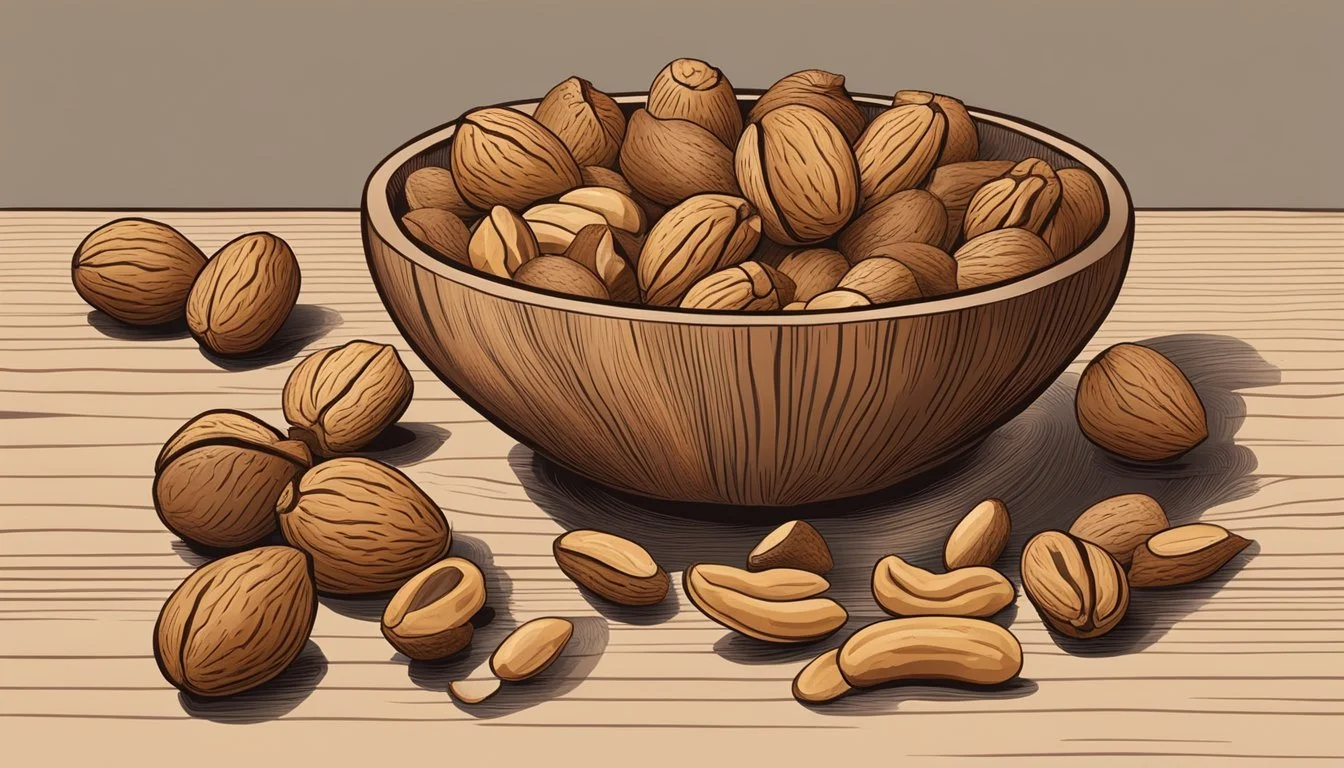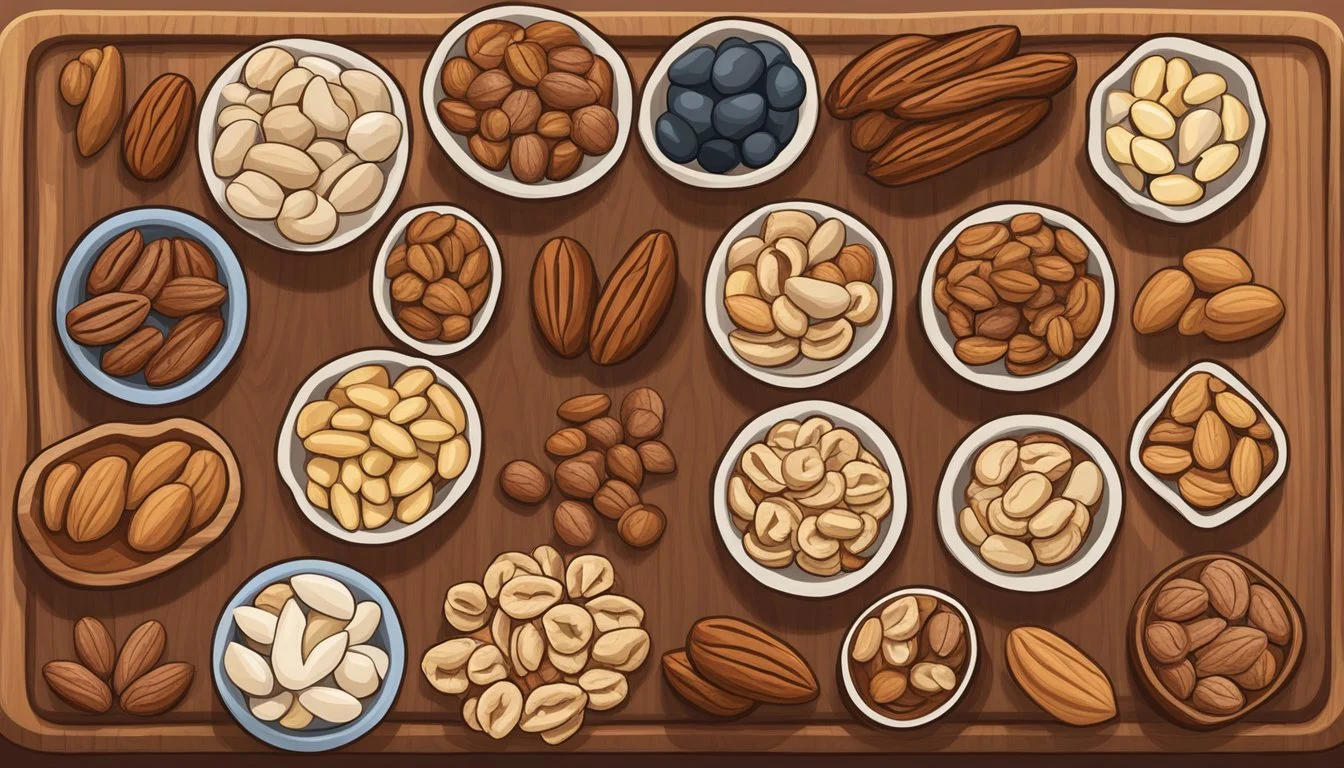Pecan Substitutes
Top Alternatives for Baking and Cooking
Pecans are a staple in many dishes, from classic pies and pralines to savory stuffings and salads. Their unique, sweet, and rich flavor, paired with a satisfying crunch, makes them a favorite ingredient for cooks and bakers alike. Given their popularity, it's no surprise that finding an adequate substitute for pecans is a common culinary challenge, particularly when faced with allergies, availability issues, or simply a desire to experiment with new flavors.
Finding a pecan substitute requires considering both taste and texture to maintain the integrity of the dish. The goal is to mimic the nut's earthy notes and buttery finish without overpowering other ingredients. Several nuts have properties similar to pecans and can serve as suitable alternatives. For instance, walnuts closely resemble the texture and have a comparable flavor profile, making them an excellent first option for replacement. Other nuts such as macadamia nuts, with their creamy consistency and rich taste, or almonds, known for their versatility, provide additional choices to replace pecans in recipes.
Understanding Pecans
Pecans are a versatile nut well-regarded for their nutritional value and culinary versatility, particularly in baking and desserts (What wine goes well with desserts?). These nuts contribute a distinct buttery flavor while providing significant health benefits due to their nutrient composition.
Nutritional Profile
Pecans contain a high level of fiber and protein, which aid in maintaining a healthy digestive system and muscle repair, respectively. Despite their high calorie content, they are low in saturated fat and rich in healthy omega-3 fatty acids. Pecans are also an excellent source of vitamins, minerals, and antioxidants, which can protect the body against oxidative stress.
Nutrient Value per 100g Calories 691 kcal Protein 9.17 g Fat (total) 71.97 g Saturated Fat 6.18 g Fiber 9.6 g Omega-3 fatty acids Variable
Culinary Uses
Pecans are celebrated for their use in various recipes, ranging from sweet desserts like pecan pie to savory dishes. They are commonly used in baking because their buttery flavor complements both baked goods and other confectioneries. Pecan oil is another product that is prized for its neutral taste, making it suitable for frying and as a substitute in recipes where pecans are called for but not their texture. In the kitchen, pecans are as versatile as they are nutritious, playing a crucial role in both taste and health.
Reasons to Substitute Pecans
In the realm of cooking and baking, one might need to substitute pecans for reasons ranging from health considerations to simply not having them on hand. Let's examine common factors leading to the search for alternative ingredients.
Allergies and Dietary Restrictions
Individuals with nut allergies require substitutes to avoid adverse reactions. Nut-free options are essential in this context, as pecans can trigger allergies. For those strictly adhering to nut-free diets, finding alternatives to pecans that do not compromise on taste or texture is a priority to prevent allergic reactions and cater to dietary restrictions.
Availability and Cost
Pecans are not always available, especially outside their harvest season or in certain regions. During holidays, demand can outstrip supply, making pecans expensive. Budget-conscious cooks may seek budget-friendly substitutes that are more accessible year-round.
Flavor and Texture Variations
Those seeking to experiment with flavor and texture might opt for substitutes to enhance their dishes. Alternatives can offer a range of flavors from earthy to buttery and can mimic the crunchy texture of pecans to complement various recipes.
Nutritional Considerations
Pecans are lauded for their health benefits including aiding in heart health, reducing cholesterol levels, and decreasing inflammation. Yet, for varied dietary fiber, benefits to brain function, and management of heart disease, one might consider pecan substitutes that better align with specific nutritional goals or needs.
Pecan Substitute Options
When looking for a pecan substitute, one considers the flavor and texture profile they wish to replicate. They look for alternatives that bring a similar crunch and buttery flavor, suitable for both sweet and savory dishes.
Tree Nuts
Walnuts: They are often the go-to replacement for pecans due to their similar texture and flavor. They can be used in a 1:1 ratio for a crunchy bite in baked goods.
Hazelnuts: Known for their distinct flavor, hazelnuts offer a unique twist yet maintain a hearty crunch. They're excellent in desserts or as a pecan replacement in crusts and toppings.
Macadamia Nuts: With a creamy, buttery taste, macadamias can enhance the richness of desserts, akin to pecans. They work well in pies and cookies where a luxurious texture is desired.
Brazil Nuts: These offer a richer, creamier profile and are larger in size. They should be chopped to match the consistency of pecan pieces.
Cashews: Cashews are softer but can mimic the mild sweetness of pecans, suitable for both cooking and baking applications.
Almonds: Almonds provide a different taste but can substitute pecans when sliced or chopped, imparting a pleasing crunch to dishes.
Pistachios: A colorful option, pistachios bring a slightly sweet flavor and are great in both savory and sweet contexts.
Pine Nuts: Small yet flavorful, pine nuts can serve as a pecan replacement, especially in pesto and salads.
Pili Nuts: These are less common but bring a buttery flavor and soft crunch, fitting as a pecan substitute in various recipes.
Seeds
Sunflower Seeds: For a nutty flavor and crunchy texture, sunflower seeds offer an allergy-friendly option in granola, salads, and breading.
Pumpkin Seeds: Pumpkin seeds, or pepitas, bring a distinct crunch and can be used in place of pecans for an added bite in dishes.
Chia Seeds: While they lack the crunch, chia seeds can be used for their health benefits and texture in puddings and as toppings.
Sesame Seeds: These seeds give a different flavor profile and are best suited to savory dishes or as a garnish, rather than as a direct pecan alternative.
Flaxseeds: Ground flaxseeds are more of a health supplement and won't replicate the texture, yet offer a subtle nutty flavor.
Nut-Free Alternatives
Coconut: Shredded coconut can stand in for pecans, offering a chewy texture and mild sweetness that complements baked goods and confections.
Granola: Crunchy granola clusters can mimic the texture of pecans in oatmeal, yogurt, and as a topping for baked treats.
Dried Fruit: Chopped dried fruits such as apricots or dates can provide sweetness and chewiness as an alternative to pecans in various preparations.
Substitute Selection by Dish
When cooking or baking with substitutes for pecans, it's essential to consider how the alternative will affect the flavor and texture of the final dish. The following sections provide guidance for selecting the best suited substitutes for various types of dishes.
Desserts and Sweet Baking
Cakes, Pies, and Quick Breads: Walnuts are an excellent choice for these types of recipes. They offer a comparable shape, size, and texture to pecans, which is crucial for the structure of baked goods.
Cookies: Macadamia nuts can be used for their creamy, buttery flavor, enhancing the richness of cookies.
For sweet toppings or sauces, consider cashews for their mild taste, making sure not to overshadow the dessert's intended flavor profile.
Savory Cooking
Salads and Roasted Vegetables: Almonds provide a similar crunch and are versatile enough for various savory dishes. They can be slivered or chopped and used as a topping for salads or mixed in with roasted vegetables.
For sauces and other savory applications where pecans are typically used as a thickener, ground almonds or cashew meal can offer a similar texture without compromising the dish's overall flavor.
By choosing the right substitute, one can maintain the integrity and appeal of the dish, whether it's the richness of a pecan pie transposed to a walnut variant or the intricate layers of flavor in a savory pecan-crusted chicken replicated using almond meal.
How to Replace Pecans in Recipes
When replacing pecans in recipes, one considers taste, texture, and dietary restrictions to find the best alternative. Accurate measurement, preservation of texture, flavor compatibility, and considerations for nut allergies are pivotal.
Exact Measurement Substitutes
For baking recipes that call for pecans, walnut halves can be used in a 1:1 ratio as they share a similar texture and structural integrity. Almonds or cashews can also serve as direct substitutes in equal amounts, especially in savory dishes where a mild, nutty flavor is desired.
Texture-Focused Substitutions
To replicate the characteristic crunch of pecans without altering measurements, pistachios and macadamia nuts are excellent choices. Pistachios provide a slightly different, yet appealing color and textural contrast. Pecan flour can be replaced with almond flour or hazelnut flour for a comparable consistency in baked goods.
Flavor-Driven Replacements
For those seeking to match the rich, buttery flavor of pecans, macadamia nuts with their creamy texture stand out. Alternatively, hazelnuts offer a distinct earthy flavor that can complement the taste profile of recipes that originally include pecans.
Seed and Nut-Free Mixtures
Individuals with a nut allergy may opt for seeds such as pumpkin seeds (pepitas) or sunflower seeds as nut-free alternatives. These seeds provide a similar crunch and can be toasted to enhance the flavor. For a richer, nut-like taste, tahini (sesame seed paste) is a valuable nut-free substitute that can be used in certain recipes, particularly where the recipe can accommodate a paste-like consistency.
Health and Nutritional Comparison
When considering pecan substitutes, it's important to compare their fiber and protein content, vitamin and mineral profiles, and fats and cholesterol levels. These factors significantly influence the nutritional benefits and can impact dietary choices, especially for individuals managing allergies or specific health conditions.
Fiber and Protein Content
Pecans offer substantial amounts of fiber and protein, which are essential for digestive health and muscle maintenance, respectively. Substitutes such as walnuts and macadamia nuts provide similar fiber content. For example, walnuts contain about 2.4g of fiber per serving, making them a close match to pecans.
Table: Comparison of Fiber and Protein Content in Nut Substitutes
Substitute Fiber (g) Protein (g) Walnuts 2.4 4.3 Macadamias 2.4 2.2
Vitamin and Mineral Profiles
Pecans are rich in vitamins and minerals such as vitamin B6, thiamin, and magnesium. Walnuts are a great alternative with similar magnesium levels, providing around 9% of the Recommended Daily Intake (RDI). Additionally, they are a good source of copper and phosphorus.
List of Key Vitamins and Minerals in Pecan Substitutes:
Macadamia nuts: Good for vitamin B6, iron, calcium.
Walnuts: High in magnesium, phosphorus, copper.
Fats and Cholesterol
Pecans are known for their heart-healthy monounsaturated fats and low cholesterol levels. Macadamia nuts, while also rich in beneficial fats, contain higher levels of saturated fat. It's important for consumers to consider these differences, especially if managing cholesterol levels.
Bold Points on Fats and Cholesterol:
Pecans are low in sodium and saturated fat, beneficial for heart health.
Substitutes like macadamia nuts have higher saturated fat content but also provide healthy monounsaturated fats.
Shopping and Storage Tips
When searching for pecan substitutes, it’s essential to consider both quality and cost-effectiveness. Substitutes should be stored properly to maintain freshness.
Selecting Quality Substitutes
One should prioritize budget-friendly alternatives to pecans that do not compromise on taste or texture. Various nuts, such as walnuts and almonds, provide similar textures and flavors as pecans. They can be found in the pantry section of most grocery stores.
To choose the best pecan replacements, inspect the nuts for any signs of spoilage or damage. Freshness can be determined by looking for nuts that are plump and free of discoloration or rancid smells.
Once purchased, store pecan substitutes in an airtight container in a cool, dry place. This helps to keep them fresh and extends their shelf life. For long-term storage, one can place them in the freezer where they can be preserved for several months.
It is also advisable to buy these nuts in bulk, which often results in cost savings. However, ensure still that the nuts are of high quality to avoid waste.





